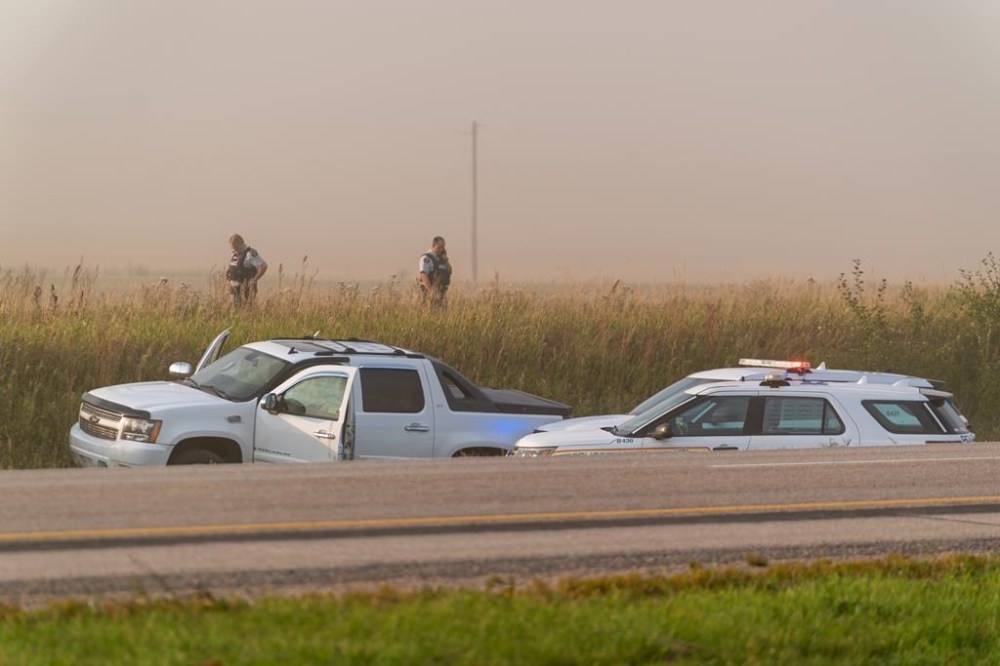‘Here to forgive’: Victims’ families, Indigenous leaders gather after mass stabbing
Advertisement
Read this article for free:
or
Already have an account? Log in here »
To continue reading, please subscribe:
Monthly Digital Subscription
$0 for the first 4 weeks*
- Enjoy unlimited reading on winnipegfreepress.com
- Read the E-Edition, our digital replica newspaper
- Access News Break, our award-winning app
- Play interactive puzzles
*No charge for 4 weeks then price increases to the regular rate of $19.00 plus GST every four weeks. Offer available to new and qualified returning subscribers only. Cancel any time.
Monthly Digital Subscription
$4.75/week*
- Enjoy unlimited reading on winnipegfreepress.com
- Read the E-Edition, our digital replica newspaper
- Access News Break, our award-winning app
- Play interactive puzzles
*Billed as $19 plus GST every four weeks. Cancel any time.
To continue reading, please subscribe:
Add Free Press access to your Brandon Sun subscription for only an additional
$1 for the first 4 weeks*
*Your next subscription payment will increase by $1.00 and you will be charged $16.99 plus GST for four weeks. After four weeks, your payment will increase to $23.99 plus GST every four weeks.
Read unlimited articles for free today:
or
Already have an account? Log in here »
Hey there, time traveller!
This article was published 08/09/2022 (1186 days ago), so information in it may no longer be current.
JAMES SMITH CREE NATION – There were hugs, tears and calls for change Thursday as Indigenous leaders gathered on the James Smith Cree Nation — a Saskatchewan community struck by a deadly mass stabbing.
Darryl Burns, whose sister was killed in the attacks Sunday, hugged Skye Sanderson, the wife of Damien Sanderson, a suspect found dead the day after the killings.
“Our family is here to forgive,” Burns said.

Forgiveness has been important to Indigenous people long before colonization, Burns added.
“That’s who we are as people. We’re forgiving, loving people. That is in our DNA. They tried to force it out of us, but they couldn’t.”
A black cloth — a symbol of mourning — covered a podium where, one by one, representatives of First Nation communities, the provincial government and the RCMP expressed condolences and promised support.
Three teepees were set up nearby to allow people to have ceremony, find healing and honour the victims.
Ten people were killed and another 18 were injured on the First Nation and in the nearby village of Weldon, northeast of Saskatoon. Nine remained in hospital in stable condition.
“Please know that you are not finding your way through this alone … we are all reaching out to support you and your families through what we know is an unthinkable and senseless tragedy,” Saskatchewan Premier Scott Moe told the news conference.
The event came one day after police arrested a second suspect who had evaded capture for four days, Myles Sanderson. Police spotted a stolen vehicle and chased it until it went into a ditch on a highway north of Saskatoon.
Sanderson died shortly after he was arrested. RCMP said he went into medical distress and was taken by ambulance to hospital. The Saskatoon Police Service said Thursday it will investigate the death along with the Serious Incident Response Team, a civilian-led provincial group.
Sanderson’s brother Damien Sanderson was found dead Monday near one of the 18 crime scenes. RCMP have said he didn’t kill himself and his brother may have killed him.
The deaths of the suspects mean the motive behind the rampage may never be known.
Indigenous leaders called for more addictions treatment and changes to the justice system in the wake of the tragedy.
Grand Chief Brian Hardlotte of the Prince Albert Grand Council told Thursday’s gathering the Parole Board of Canada had failed the community. The board released Myles Sanderson on statutory release earlier this year, despite a long list of criminal convictions that included violence. He had been wanted since May for being unlawfully at large.
“The parole board let this young fellow out, this young man, and they didn’t notify any of our community members or our leadership,” Hardlotte said.
“This tragedy could have been avoided.”
Other leaders called for more First Nations policing, which they said could provide faster response times and a more grassroots connection to the communities.
RCMP Commissioner Brenda Lucki said the force is increasing its Indigenous recruitment of officers to help work toward an Indigenous self-governed police service.
“This can never happen again, this senseless violence,” she said.
She later told The Canadian Press that Mounties plan to eventually release more details of the attacks, including a timeline, because it knows how impactful the attacks have been on the community.
Chief Calvin Sanderson of the Chakastaypasin Band said he lost loves ones in the attack. He said it will take time for people in the region to process the attacks.
“It’ll take a while for our community to heal, and we’re starting that process today,” he said.
“As you can see, so many tents around here and our teepees. The fires that were lit for the families will be soon put out, when we are done our grieving and saying our farewell.”
This report by The Canadian Press was first published Sept. 8, 2022.


